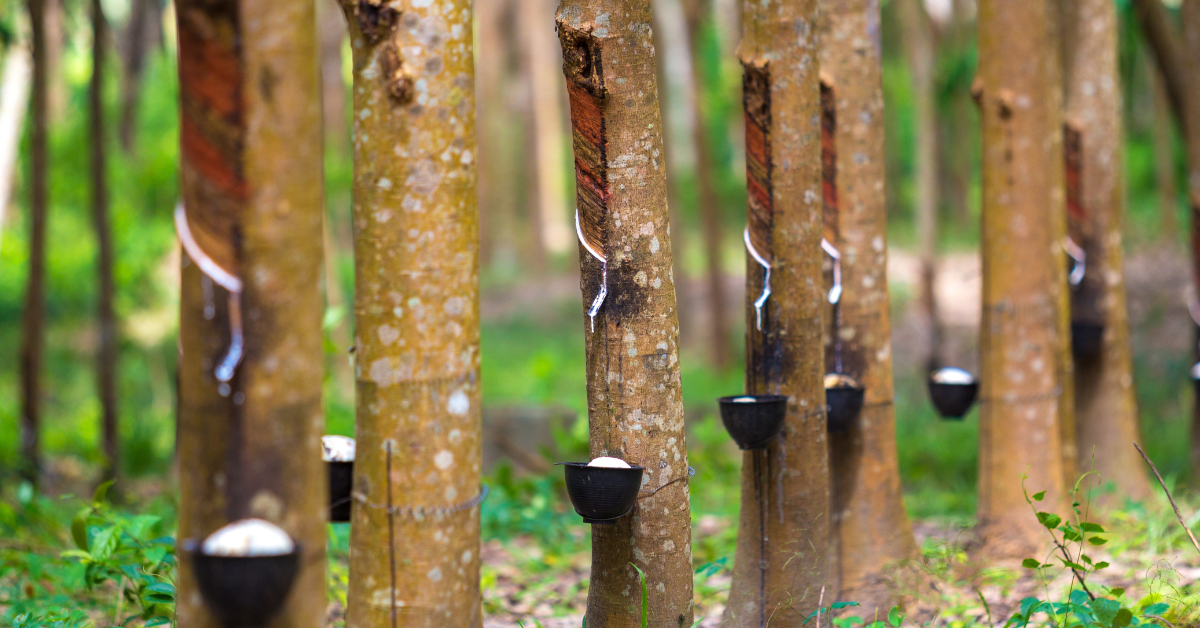Contact: +91 99725 24322 |
Menu
Menu
Quick summary: TraceX helps rubber companies in Germany meet EUDR requirements with automated Due Diligence Statement (DDS) generation, farm-level traceability, and deforestation risk verification.

The EUDR DDS for Rubber Supply Chain in Germany requires all rubber imported into the EU to be deforestation-free and legally produced. From December 30, 2025, German importers, manufacturers, and traders must submit a Due Diligence Statement (DDS) with verified geolocation data for every plantation involved in rubber sourcing.
As Germany serves as a key hub for Europe’s tyre and industrial rubber sectors, compliance demands end-to-end traceability, supplier verification, and data integration across global supply chains. Digital platforms like TraceX enable automated DDS submissions, blockchain traceability, and AI-powered risk assessments to ensure seamless EUDR compliance.
he EUDR Landscape for Rubber in Germany
Germany stands at the centre of Europe’s rubber and tyre manufacturing ecosystem, importing vast quantities of natural rubber from Southeast Asia and parts of Africa for use in automotive, industrial, and consumer goods. Under the EU Deforestation Regulation (EU 2023/1115), all rubber entering the EU must be deforestation-free and legally produced, linking each batch of rubber to verified plantation-level data.
From December 30, 2025, German importers, processors, and manufacturers classified as large operators must file a Due Diligence Statement (DDS) containing geolocation data for every sourcing plantation. This statement must prove that the raw material was not cultivated on recently deforested land and complies with local environmental and human rights laws.
As a key import hub and production base for leading tyre and automotive companies, Germany will be under heightened regulatory scrutiny. Businesses that fail to ensure end-to-end traceability risk market disruption, financial penalties, and loss of access to EU buyers prioritizing ethical sourcing.
With EUDR enforcement fast approaching, digital traceability systems combining blockchain, AI, and supplier onboarding tools are becoming essential for maintaining transparency, compliance, and competitiveness in Germany’s rubber value chain.
Master the step-by-step process of submitting Due Diligence Statements under the new EUDR rules.
Read the blog on filing DDS for EUDR compliance
Explore how rubber importers in Germany can achieve traceability, transparency, and compliance under EUDR.
Read the full blog on EUDR Rubber Compliance
What are the Challenges Facing German Rubber Importers & Manufacturers
German rubber manufacturers and importers face significant hurdles as they prepare for EUDR (EU 2023/1115) compliance. The sector’s complex and multi-tiered sourcing network stretching from smallholder plantations in Southeast Asia and Africa to German tyre, automotive, and industrial goods producers poses unique traceability challenges.
To overcome these challenges, German rubber companies must digitally transform their procurement and compliance systems, investing in blockchain traceability, supplier onboarding tools, and AI-powered risk monitoring. Early adoption not only reduces compliance risks but also positions companies as leaders in sustainable, deforestation-free sourcing.
How Digital Platforms from TraceX Simplify EUDR DDS for Rubber
The EUDR mandates that every shipment of natural rubber entering the EU must be deforestation-free, legally produced, and traceable to its plantation of origin. For Germany’s rubber importers, tyre manufacturers, and industrial producers, manual compliance is no longer feasible. TraceX’s digital platform offers a streamlined, technology-driven solution to simplify and automate the entire EUDR DDS (Due Diligence Statement) process.
By combining blockchain integrity, AI analytics, and farmer-first digital tools, TraceX transforms EUDR compliance from a regulatory burden into a competitive advantage. Companies using TraceX gain not only operational efficiency but also trust, transparency, and ESG credibility across their global rubber supply chain.
Why It Matters for the German Rubber Sector
The German rubber sector sits at the heart of Europe’s automotive and industrial manufacturing landscape, and with the EU Deforestation Regulation (EUDR) in force, compliance is no longer just an obligation; it’s a pathway to leadership in sustainability, transparency, and brand differentiation.

By embracing digital transformation through platforms like TraceX, German rubber importers and manufacturers can ensure full EUDR compliance, drive sustainability goals, and maintain their competitive standing in an increasingly regulation-focused global market.
Future-Proofing Germany’s Rubber Supply Chain
The EUDR DDS for Rubber Supply Chain in Germany marks a turning point for one of Europe’s most vital manufacturing sectors. As the December 2025 compliance deadline approaches, the ability to demonstrate traceable, deforestation-free sourcing will become a prerequisite for market participation not a differentiator. German importers, tyre manufacturers, and rubber processors must now move beyond manual systems toward AI-powered, blockchain-backed traceability platforms that ensure data integrity and audit readiness.
By adopting TraceX’s digital compliance ecosystem, businesses can simplify DDS generation, integrate plantation-level insights, and mitigate regulatory and reputational risks. This proactive approach doesn’t just achieve compliance it builds resilient, transparent, and sustainable supply chains ready for the future of global trade.
Understand the key components of EUDR compliance and how to streamline your DDS process efficiently.
Read the blog on EUDR Due Diligence
Learn how AI-driven automation and intelligent workflows simplify data collection, verification, and reporting.
Explore the blog on Agentic AI for EUDR
Unpack the biggest hurdles faced by importers under EUDR and how technology can turn compliance into a competitive edge.
Read the blog on Challenges for EU Importers
The EUDR is a regulation by the European Union aimed at preventing deforestation-linked commodities like rubber from entering the EU market. It requires full supply chain traceability and submission of Due Diligence Statements (DDS) proving compliance.
A DDS is a formal declaration confirming that rubber imported or sold in Germany is deforestation-free and legally sourced. It must include farm-level geolocation data and risk assessment documentation.
All German importers, traders, processors and retailers handling rubber are required to comply. Both large corporations and small operators must provide DDS documentation for their supply chains.
Common difficulties include gathering farm-level data, verifying deforestation-free claims, managing multiple smallholders, and preparing DDS documents manually.
TraceX digitizes the entire process of mapping rubber farms, verifying deforestation risks via satellite data, and auto-generating compliant DDS reports ready for submission.
Yes. TraceX is built for scalability and ease of use. It supports both large enterprises and smallholder networks, enabling simple data collection via mobile apps
